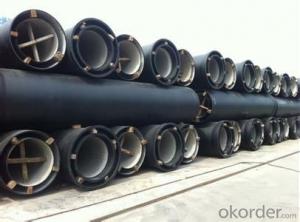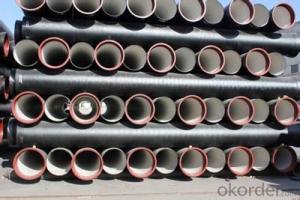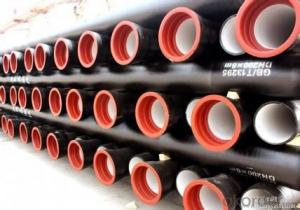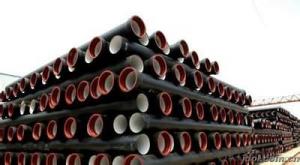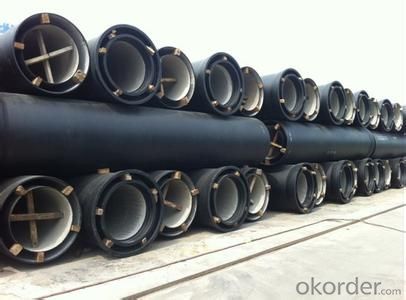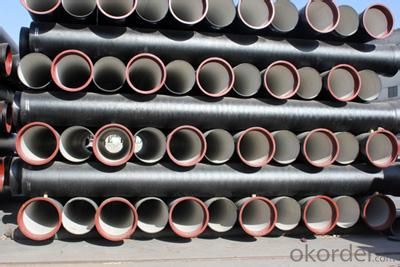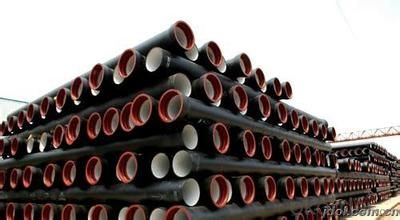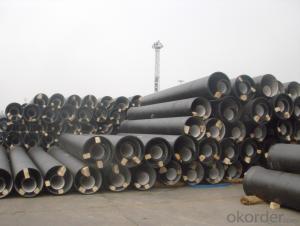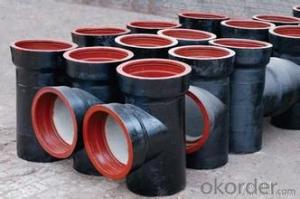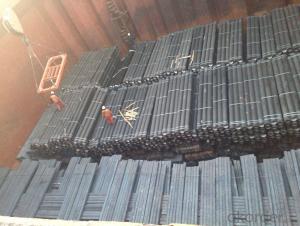DUCTILE IRON PIPE K9 DN125
- Loading Port:
- China Main Port
- Payment Terms:
- TT OR LC
- Min Order Qty:
- -
- Supply Capability:
- -
OKorder Service Pledge
OKorder Financial Service
You Might Also Like
Ductile Iron Cast Pipe is without any defects compare with tradition casting tech, which has many advantages particularly as follow:
(1) High density. In the "vertical upward casting" process, the melt iron of centre liquid column in center crystallizer is continuously feeding for volume shrinkage caused by condensation tube at outer circumference , which lead to be free of shrinkage porosity.
(2) High purity. When melt iron pouring, the mixed impurities such as gas, dross, sand grain which are lighter than melt iron could be eliminated at furnace mouth, its impossible to enter into the crystallizer through the channel, so the melt iron into the crystallizer is very pure.
(3) Strength with toughness. The cooling speed provided by continuous crystallizer is 30 times than sand casting and 5 times than centrifugal casting, and doesn't produce white iron, the eutectic cell volume of continuous cast iron is one eighth to one tenth compare with traditional cast iron. The density of graphite nodule in ductile iron can reach 300-700 pcs/mm2. Therefore, all reason above improve the strength and toughness of continuous cast iron.
(4) Free machining. The high speed cooling make the hardening phase (such as boride, steadite) not appear like reticular, massive or thick, but diffuse like fish bone and pane in shape, moreover, there are tiny graphite flakes inlaid hardening phase. It's free machining in BrinellHardness the range of 250-300HB. However, the Brinell Hardness of 250 is top limit to common metal materials.
(5) Uniform composition of tube wall. The convection mixing of liquid column caused by marching type drawing in crystallizer make the composition of tube wall well-distributed, and concentration gradient very little.
(6) High productivity. To the wall thickness of tube under 10mm, the speed of continuous casting is 1 meter/min, to the wall thickness of tube under 20mm, the speed of continuous casting is 0.5 meter/min, which is high efficiency that centrifugal or other casting tech couldn't reach.
- Q: Can ductile iron pipe be used for both water and sewage applications?
- Yes, ductile iron pipe can be used for both water and sewage applications. Ductile iron pipe is known for its strength, durability, and corrosion resistance, making it suitable for a wide range of applications, including conveying both water and sewage. Its high tensile strength allows it to withstand the high pressure and heavy loads associated with water and sewage systems. Additionally, ductile iron pipe has a smooth interior surface that helps to minimize friction and improve flow efficiency, making it ideal for transporting both water and sewage. The material's resistance to corrosion and chemical attack ensures a long service life, even in harsh environments. Furthermore, ductile iron pipe is available in a variety of sizes and configurations, allowing it to be customized to meet the specific requirements of water and sewage applications. Overall, ductile iron pipe is a reliable and versatile choice for both water and sewage conveyance.
- Q: Are ductile iron pipes suitable for installation in areas with high soil compaction and traffic loads?
- Yes, ductile iron pipes are suitable for installation in areas with high soil compaction and traffic loads. Ductile iron pipes have high strength and durability, making them capable of withstanding heavy loads and compression from soil compaction. They offer excellent resistance to external forces and have a long lifespan, making them a reliable choice for such conditions.
- Q: Can ductile iron pipes be used in agricultural applications?
- Yes, ductile iron pipes can be used in agricultural applications. Ductile iron pipes are known for their strength, durability, and corrosion resistance, making them suitable for various agricultural uses such as irrigation systems, water supply networks, and drainage systems. They can withstand high pressure, handle heavy loads, and are also resistant to external factors like soil movements and root penetration.
- Q: Can ductile iron pipes be used in contaminated groundwater systems?
- Contaminated groundwater systems can indeed utilize ductile iron pipes. Renowned for their strength and durability, ductile iron pipes are versatile and applicable in various settings, including water and wastewater systems. These pipes possess corrosion-resistant properties that safeguard against both internal and external corrosion, thus ensuring reliable water transportation, even in the presence of contaminated groundwater. When addressing contaminated groundwater, it becomes imperative to assess the extent and nature of the contamination. Ductile iron pipes exhibit resistance to numerous common chemicals typically found in groundwater, including specific acids and alkalis. However, in instances of severe or specific chemical contamination, it may be necessary to explore alternative pipe materials that offer superior resistance to those particular substances. Moreover, the proper installation and maintenance of ductile iron pipes are vital for their long-term performance within contaminated groundwater systems. Regular inspections, cleaning, and the use of suitable protective coatings can effectively mitigate any potential risks associated with contamination. In conclusion, ductile iron pipes can be effectively employed in contaminated groundwater systems, provided that the level and type of contamination fall within acceptable limits and appropriate installation and maintenance practices are observed. It is always advisable to seek guidance from experts and consider local regulations and guidelines when determining the suitability of pipe materials in specific groundwater systems.
- Q: What are the disadvantages of using ductile iron pipe?
- Some of the disadvantages of using ductile iron pipe include its relatively high cost compared to other materials, its susceptibility to corrosion over time, and its heavy weight which can make installation more challenging. Additionally, ductile iron pipe may require more maintenance and repairs due to potential cracking or leaking.
- Q: Can ductile iron pipes be used for stormwater drainage?
- Yes, ductile iron pipes can be used for stormwater drainage. Ductile iron pipes are known for their strength, durability, and ability to withstand heavy loads, making them a suitable choice for various applications, including stormwater drainage systems.
- Q: How are ductile iron pipes protected against root intrusion?
- Ductile iron pipes are protected against root intrusion through the use of protective coatings and barriers. One common method is to apply an external coating, such as a bituminous or epoxy layer, which acts as a deterrent for root penetration. Additionally, root barriers made of high-density polyethylene or other materials can be installed around the pipes to further prevent root intrusion. These measures help to maintain the structural integrity of the pipes and prevent any potential damage caused by root growth.
- Q: How to distinguish flexible and rigid interfaces between cast iron pipe joints
- Rigidity is a way of connection that has been eliminated. Sealing is achieved by pouring cement into the spigot
- Q: Can ductile iron pipes be used for bridge crossings?
- Yes, ductile iron pipes can be used for bridge crossings. Ductile iron is a strong and durable material that is commonly used in various applications, including water and wastewater systems. When it comes to bridge crossings, ductile iron pipes offer several advantages. They have high tensile strength, which allows them to handle the load and stress imposed by the bridge structure. Additionally, ductile iron pipes are resistant to corrosion, making them suitable for environments where bridges may be exposed to moisture and other harsh conditions. Furthermore, ductile iron pipes have the ability to withstand seismic activity, making them a reliable choice for areas prone to earthquakes. Overall, ductile iron pipes are a suitable and reliable option for bridge crossings due to their strength, durability, corrosion resistance, and ability to withstand seismic activity.
- Q: Ductile iron pipe joint leakage
- After cleaning the pipe mouth, the cf-2000 high efficiency composite waterproof agent is used to seal it, and it will not leak.
Send your message to us
DUCTILE IRON PIPE K9 DN125
- Loading Port:
- China Main Port
- Payment Terms:
- TT OR LC
- Min Order Qty:
- -
- Supply Capability:
- -
OKorder Service Pledge
OKorder Financial Service
Similar products
Hot products
Hot Searches
Related keywords
